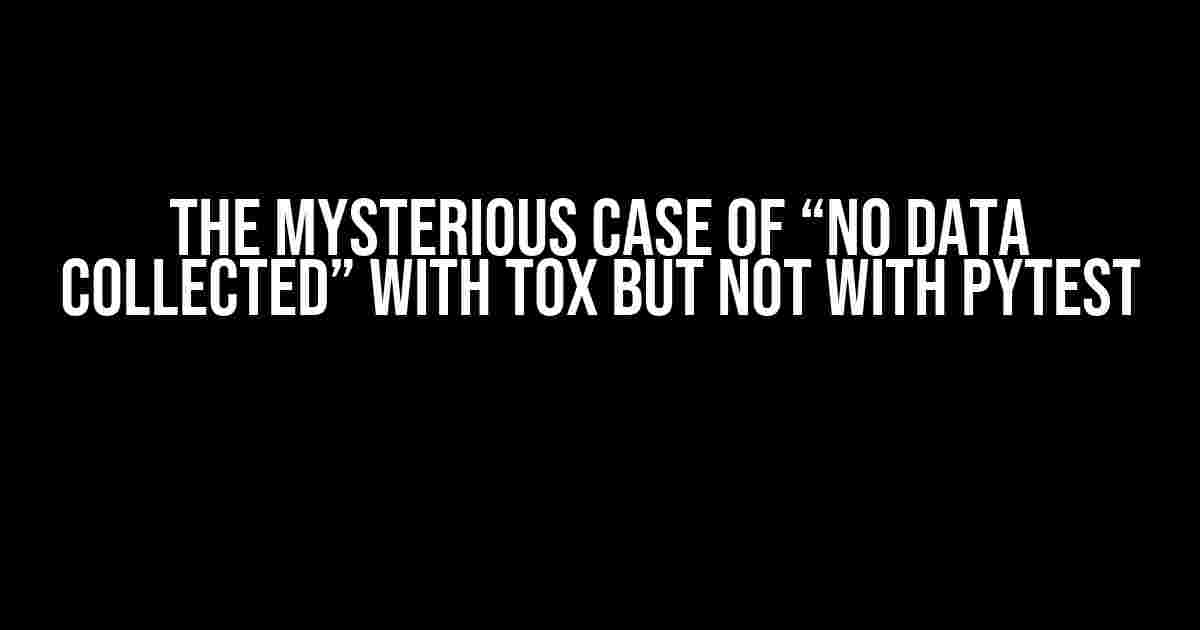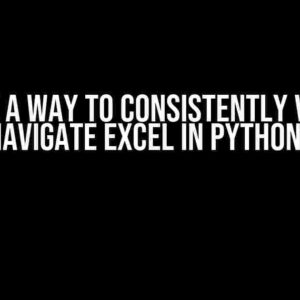If you’re reading this, you’re likely frustrated with the enigmatic issue of seeing “no data collected” when running tests with Tox but not when running tests with Pytest. Fear not, dear developer, for you’re about to uncover the secrets behind this puzzling phenomenon.
What is Tox, anyway?
Tox is an automation tool that runs multiple isolated test environments, ensuring your Python package works seamlessly across different Python versions and dependencies. It’s a fantastic tool for ensuring compatibility and catching errors early.
What about Pytest?
Pytest is a popular testing framework for Python that provides a lot of flexibility and customization options. It’s often used in conjunction with Tox to run tests across different environments.
The Problem: “No Data Collected” with Tox
So, you’ve written your tests, set up Tox, and ran the command tox -e py38 (or your preferred Python version). But, to your surprise, you see the dreaded message:
no data collected
You scratch your head, wondering what went wrong. After all, your tests work perfectly fine when running them with Pytest directly, like this:
pytest
What’s going on? Why is Tox not collecting any data?
The Culprit: Test Discovery
The root of the problem lies in how Tox and Pytest discover tests. Pytest uses a discovery mechanism that looks for tests in the current working directory and its subdirectories. Tox, on the other hand, uses a different mechanism to discover tests, which can sometimes lead to the “no data collected” issue.
How Tox Discovers Tests
Tox uses the testpaths configuration option to determine where to look for tests. By default, Tox looks for tests in the tests directory and its subdirectories. If your tests are not in this directory, Tox won’t find them.
How Pytest Discovers Tests
Pytest, on the other hand, uses a more flexible approach to test discovery. It looks for tests in the current working directory and its subdirectories, using a set of default patterns to identify test files and modules. Pytest also respects the PYTEST_DONT_REWRITE environment variable, which allows you to customize test discovery.
Solutions to the “No Data Collected” Problem
Now that we’ve identified the culprit, let’s explore some solutions to get Tox to collect data correctly.
Solution 1: Update Your Tox Configuration
Modify your tox.ini file to include the correct testpaths:
[tox] testpaths = tests, mytests, moretests
In this example, we’re telling Tox to look for tests in the tests, mytests, and moretests directories.
Solution 2: Use the Pytest Test Discovery Mechanism
Tox provides an option to use Pytest’s test discovery mechanism. Add the following to your tox.ini file:
[tox] testpaths = pytest
This tells Tox to use Pytest’s test discovery mechanism, which should fix the “no data collected” issue.
Solution 3: Set the PYTEST_DONT_REWRITE Environment Variable
You can set the PYTEST_DONT_REWRITE environment variable to disable Pytest’s automatic test rewriting. Add the following to your tox.ini file:
[tox]
setenv =
PYTEST_DONT_REWRITE = 1
This solution works particularly well when you’re using a custom test discovery mechanism.
Additional Tips and Tricks
Here are some additional tips to help you troubleshoot and optimize your testing setup:
-
Use the
-vflag with Tox to increase verbosity and get more detailed output:tox -v -e py38
-
Verify that your tests are correctly formatted and follow the naming conventions expected by Pytest (e.g.,
test_*.py). -
Make sure your
tox.inifile is correctly formatted and indentation is correct. -
Experiment with different test discovery mechanisms to find the one that works best for your project.
Conclusion
The “no data collected” issue with Tox but not with Pytest can be frustrating, but with these solutions and explanations, you should be able to resolve the problem and get your testing setup running smoothly. Remember to update your Tox configuration, use Pytest’s test discovery mechanism, or set the PYTEST_DONT_REWRITE environment variable to get Tox to collect data correctly.
Happy testing, and may your code be bug-free!
Frequently Asked Question
Get the scoop on the mysterious case of “no-data-collected” when running tests with tox but not when running tests with pytest!
Why does tox not collect data when running tests, but pytest does?
Tox and pytest use different mechanisms to collect test data. Tox uses its own test runner, whereas pytest uses its own plugin system to collect data. If tox is not properly configured to collect data, it won’t do so, even if pytest does. Check your tox configuration files to ensure that data collection is enabled!
Is there a specific tox configuration that I need to tweak to collect data?
Yes, you need to set the `envlist` parameter in your tox configuration file (usually `tox.ini`) to specify the environment variables that should be collected. For example, you can add `envlist = MY_VAR,OTHER_VAR` to collect the `MY_VAR` and `OTHER_VAR` environment variables.
Can I use the same data collection plugins with tox as I do with pytest?
Not directly, unfortunately. Tox and pytest have different plugin architectures, so you can’t use pytest plugins directly with tox. However, many pytest plugins have equivalent tox plugins that you can use to collect data. Check the tox documentation for available plugins and how to use them!
Why does tox require a specific test runner, whereas pytest doesn’t?
Tox is designed to be highly flexible and customizable, which is why it uses its own test runner. This allows tox to support a wide range of testing frameworks and environments. Pytest, on the other hand, is built specifically for testing Python code, so it can rely on its own built-in test runner. Tox’s approach gives you more control, but also requires more configuration effort.
Is there a way to use pytest with tox to collect data, without having to configure tox separately?
Yes, you can! Tox provides a pytest plugin that allows you to use pytest as the test runner, while still benefiting from tox’s environment management and flexibility. This way, you can use pytest’s data collection features with tox, without having to configure tox separately. Check the tox documentation for more information on how to use this plugin!



